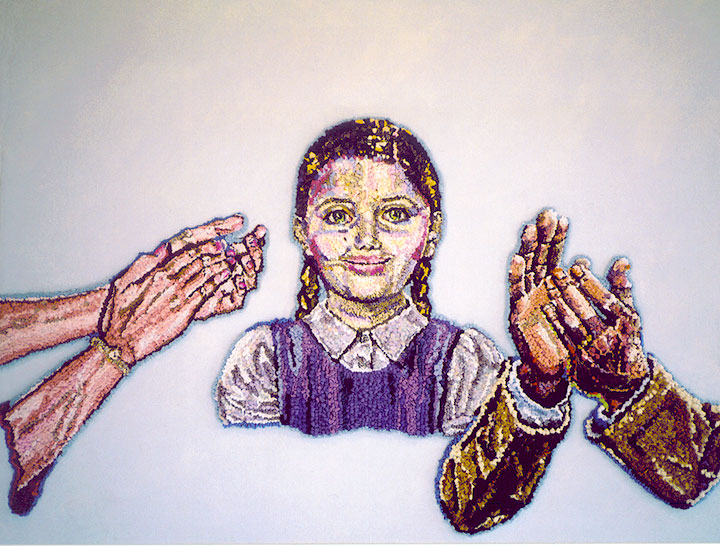An Immigrant Child’s Fragile Sense of Self

Copyright © Linda Friedman Schmidt, Implausible Applause, discarded clothing, tinted gesso, 40 x 48 in.
Self-Identity Confused
I lost my self-understanding at age 5 on the first day of kindergarten when the teacher called me Lonia. I thought I was Linda. At first I didn’t know she was talking to me. Suddenly discovering that life as I knew it was based on a long-term falsehood was shocking and traumatic. My life narrative was invaded. How could I know what was real going forward? Would I remain the same person if my name was taken away? How could I trust my parents? Why didn’t they tell me about this other name? I could not understand why a name was given and then taken away. A five year old does not think of a name as an arbitrary designation but rather as a guarantee of identity.
New Country, New Self
Shortly after we arrived in the USA quick cultural assimilation became a priority for my parents. The first thing they did was to change all of our first names to American names. As far back as I can remember, and from the time I was six months old, I was Linda. I was never told that I had a different birth name. It was only after I made the discovery in school that my mother and father briefly attempted to explain. But it was too late; I already suffered a major upheaval, a self-identity crisis that would last a lifetime. I felt betrayed, robbed of my story.
In hindsight my parents failure to support my sense of self may have been due to a language barrier. Yiddish was spoken at home. After five years in America, simple conversation in English was still difficult for my mother. She was the one who registered me for school. A birth certificate was required for registration and my given name Lonia was inscribed on my German birth certificate. My mother probably did not understand that this would become my school name. She may have been unable to explain to the clerk that I was called Linda.
My parents did not understand how difficult it would be for a bi-cultural immigrant child to reconcile American culture with her culture of origin when she knew nothing about her given name. It was a mistake to hide the name on my birth certificate from me.
True Self/False Self
Growing up I secretly considered Lonia to be my true self. My parents did not applaud this authentic self, my true essence. They applauded Linda in a role she was playing to satisfy them. For much of my childhood I felt tension between the child they were applauding and the real me. Behind my impressive achievements there was a frustrated, conflicted experience of being a false self. I was stuck in an uncomfortable place not sure who I really was. One thing was certain – they didn’t want an artist.
Linda was loved only for her accomplishments, success, and good qualities. She grew up defined by her intelligence, and looks. If she wanted to be loved she had to skip grades in school and look pretty. Linda learned early on to become the person her parents wanted her to be. In elementary school she was already a seasoned performer skipping the second grade. Later, she skipped the eighth grade. She graduated from high school right after her 16th birthday and was teaching high school when she was 20, a profession they selected for her.
A Sudden Insight Years Later
In a recent newspaper article I came across an unfamiliar word “Polonia.” In it I saw my birth name Lonia. I never thought the name had any special significance; I assumed it was a popular Eastern European name at the time I was born. An epiphany moment came when I looked up the definition in the Merriam-Webster dictionary: Polonia: people of Polish descent living outside of Poland.
After reading this I understood why my parents named me Lonia, short for Polonia. They understood that place of birth helps shape self-identity. A child born stateless in a displaced persons camp needed a connection to a “place,” a national identity. Every child had a right to a name and a nationality. The name Lonia symbolically conferred their nationality on their child. Insight has the power to transform. This insight helped me understand that my parents cared about me and had good intentions.
My mother and father had loved their homeland Poland but lost the tie to their roots with the arrival of the Nazis. They wanted to connect their first child to this heritage, to her cultural identity and ancestry. Her name was to be a lifelong reminder of family history, a cultural identifier that would instill a sense of pride in her heritage, and a desire to hold on to that heritage. The name Lonia held such significance for them and for the child. It was such a unique, meaningful name. By the age of six months the name was already imprinted in my subconscious. I have never really felt like a “Linda.”

Comments are closed.